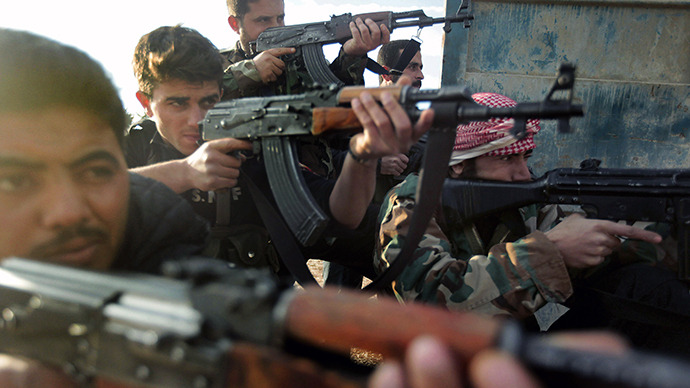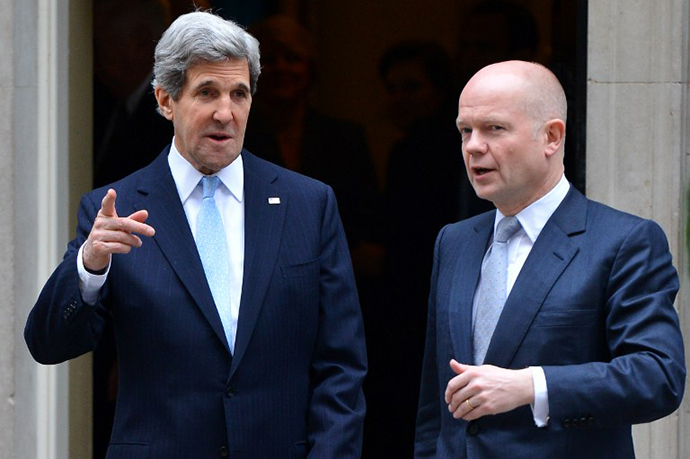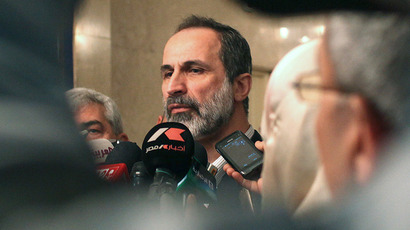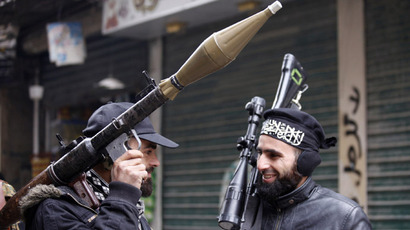US, EU may start training and equipping Syrian rebels

The US will increase aid to the Syrian opposition, the White House has announced. Europe may follow suit by increasing aid to the Free Syrian Army (FSA). The decision is expected after a key conference on Syria in Rome.
"We will continue to provide assistance to the Syrian people, to the Syrian opposition, we will continue to increase our assistance in the effort to bring about a post-Assad Syria," White House Press Secretary Jay Carney said in a statement.
"We are constantly reviewing the nature of the assistance we provide to both the Syrian people, in form of humanitarian assistance, and to the Syrian opposition in the form of non-lethal assistance," he said.
So far the US has no plans to provide the Syrian insurgency with
body armor, vehicles or military training, Reuters reported citing
sources familiar with the matter.
Washington is however changing its policy on the conflict, and will send “medical supplies and food” directly to the rebels, sources said.
Earlier, the Washington Post reported that the White House is
considering sending the rebels body armor and armed vehicles, and
also possibly providing military training.
Until now, Western countries’ official support to the forces fighting against Syrian President Bashar Assad was limited to direct contact, logistical assistance and political backing.
Several top figures in the Obama administration, including former Secretary of State Hillary Clinton, former Defense Secretary Leon Panetta and former CIA chief David Petraeus pushed for closer engagement with the Syrian rebels last year, which would likely include arming them.
The White House rejected the plan at the time, fearing that the arms would end up in the hands of Islamist forces like the Nursa Front group, which the US considers a terrorist organization. US officials said it was too difficult to fully vet the recipients of the proposed deliveries; that policy has now apparently changed.
The pending shift was hinted at on several occasions as new US Secretary of State John Kerry toured Europe recently. He pledged not to leave the Syrian opposition “dangling in the wind,” after meeting British Prime Minister David Cameron and Foreign Secretary William Hague. The new US policy will likely be voiced after an international conference of the ‘Friends of Syria’ in Rome on Thursday.
A delegation from the exiled Syrian National Coalition will be attending the Rome conference, despite earlier threats to boycott it. The group reversed course and agreed to attend after a series of phone calls to coalition leader Mouaz Khatib from top US officials.
But the Rome meeting is unlikely to bring any ease to the Syrian conflict, as international politics has always been about shifting power - not about the people, Middle East expert Younes Abouyoub told RT.
“If they really wanted to help the Syrian people they should
have sought a political settlement from the beginning,”
Abouyoub said. “Now we are entering almost a third year of the
conflict by continuing to fuel this conflict by bringing weapons
and money to certain parts of the opposition. And it is just
getting worse and worse.”
European advocates said the Free Syrian Army should be provided with large supplies of munitions, including military vehicles, body armor and night vision goggles, as well as tactical and strategic training. This position is privately supported by Britain, France, Germany and Italy, a European official told the Washington Post on condition of anonymity.
London and Paris have pushed to lift an EU embargo on arms trades to Syria. However, the ban was prolonged until at least May, as some nations in the 27-member union have refused to lift it.

The US appears more skeptical, and is reluctant to include body armor and training in the package, Washington sources told AP, though it would not oppose its European allies on the matter, sources said.
When asked Tuesday about the prospects for expanding US military support for the rebels, Kerry said he would not speculate on the outcome of the meeting with opposition leaders.
“We’re going to Rome to bring a group of nations together precisely to talk about this problem,” Kerry said. “I don’t want to get ahead of that meeting or ability to begin to think about exactly what will be a part of it.”
The Syrian opposition relies on arms smugglers from Turkey and Jordan, and raids on Syrian army depots, for weapons and ammunition; rebel groups with better financial standing and more ruthlessness end up with the best equipment. Most of the arms funneled to Syria went to hardline Islamists, according to a US assessment cited by the New York Time last October.
The Nusra Front, which is estimated to have some 5,000 fighters operating in Syria in small semi-independent groups, has to a large degree sidelined the relatively moderate Free Syrian Army. The groups remain at odds not only with the Assad government in Damascus, but also with each other, holding different visions for the future of Syria.
In an effort to boost the FSA and undermine the Nursa Front, Washington had Saudi Arabia and other Arab countries deliver arms to the FSA from Croatia, according to the New York Times. Rebels said that the shipment included anti-aircraft and armor-piercing weapons, mortars and rocket launchers.














